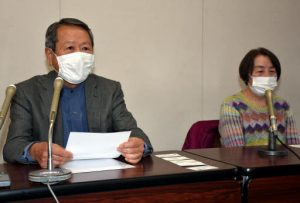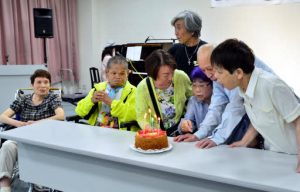A-bomb survivors with microcephaly ask Japan, world’s only A-bombed country, to ratify TPNW
Jan. 23, 2021
by Kyosuke Mizukawa, Staff Writer
“A-bomb survivors with microcephaly and cognitive disabilities never utter the words ‘elimination of nuclear weapons.’ However, their existence alone speaks to the inhumanity of nuclear weapons.” Issuing that message at a press conference, Yoshio Nagaoka, 71, a resident of Hiroshima’s Asaminami Ward and president of the Kinoko-Kai (Mushroom Club) of A-bomb survivors with microcephaly and their families, welcomed the Treaty on the Prohibition of Nuclear Weapons (TPNW), which entered into force on January 22.
A-bomb microcephaly was caused when those with the disorder were exposed to a powerful dose of radiation from the atomic bomb while in their mother’s womb, and frequently involves cognitive and physical impairments. The Mushroom Club now has 15 microcephaly patients as members, with Mr. Nagaoka’s older brother being one of them.
The Club has mainly focused on providing support for the daily lives of such patients and has to this point refrained from taking public action by making political demands. Nevertheless, the group recently held the unprecedented press conference at Hiroshima City Hall, calling the entry into force of the nuclear ban treaty a significant step toward the abolition of nuclear weapons, which the generation of their deceased parents had also strongly desired.
The message announced by the group read in part, “Had they not been exposed to the atomic bomb in their mother’s womb, they would have lived a very different life.”
On August 6, 1945, Mr. Nagaoka’s older brother, now 74 years of age, was exposed to the atomic bomb in the womb of his mother, Chizuno, who happened to be in a wooden house about 900 meters away from the hypocenter (and who died in 2003 at the age of 80). When his brother was born in February 1946, Mr. Nagaoka said he weighed only about 1,000 grams.
Mr. Nagaoka now visits his brother, who lives alone in Hiroshima, every four days to help with cleaning and clothes washing.
“My brother still cannot do even simple calculations. When shopping, he always uses paper money no matter how small his purchase. By paying with bills, he can receive change. As a result, his coin purse is full. He never uses the coins, though, because he doesn’t know how.”
“One day, he asked me, ‘What do you think would have become of me if I hadn’t met up with the bomb?’ I was at a loss as to how to respond.” Such exchanges between Mr. Nagaoka and his brother are also incorporated into the message.
According to Mr. Nagaoka, some of the group’s members have been bedridden or hospitalized due to poor health and some cannot receive support from their families. Considering the harsh reality they face, he finally felt he could not remain silent about the current government stance.
At the press conference, Mr. Nagaoka called on the national government to sign and ratify the treaty. “Nuclear weapons can harm even the smallest life in the mother’s womb with radiation. What on earth is the government of Japan, which calls itself the only country in the world to have experienced an atomic bombing, trying to do by turning its back on the nuclear ban treaty?” he said.
Hiroe Kawashimo, 74, another microcephaly patient who lives in Hiroshima’s Higashi Ward, attended the press conference with other Club members. On that day, the Mushroom Club sent their message in the form of a letter of request to Japan’s Prime Minister Yoshihide Suga and the speakers of both houses of the Diet.
(Originally published on January 23, 2021)
“A-bomb survivors with microcephaly and cognitive disabilities never utter the words ‘elimination of nuclear weapons.’ However, their existence alone speaks to the inhumanity of nuclear weapons.” Issuing that message at a press conference, Yoshio Nagaoka, 71, a resident of Hiroshima’s Asaminami Ward and president of the Kinoko-Kai (Mushroom Club) of A-bomb survivors with microcephaly and their families, welcomed the Treaty on the Prohibition of Nuclear Weapons (TPNW), which entered into force on January 22.
A-bomb microcephaly was caused when those with the disorder were exposed to a powerful dose of radiation from the atomic bomb while in their mother’s womb, and frequently involves cognitive and physical impairments. The Mushroom Club now has 15 microcephaly patients as members, with Mr. Nagaoka’s older brother being one of them.
The Club has mainly focused on providing support for the daily lives of such patients and has to this point refrained from taking public action by making political demands. Nevertheless, the group recently held the unprecedented press conference at Hiroshima City Hall, calling the entry into force of the nuclear ban treaty a significant step toward the abolition of nuclear weapons, which the generation of their deceased parents had also strongly desired.
The message announced by the group read in part, “Had they not been exposed to the atomic bomb in their mother’s womb, they would have lived a very different life.”
On August 6, 1945, Mr. Nagaoka’s older brother, now 74 years of age, was exposed to the atomic bomb in the womb of his mother, Chizuno, who happened to be in a wooden house about 900 meters away from the hypocenter (and who died in 2003 at the age of 80). When his brother was born in February 1946, Mr. Nagaoka said he weighed only about 1,000 grams.
Mr. Nagaoka now visits his brother, who lives alone in Hiroshima, every four days to help with cleaning and clothes washing.
“My brother still cannot do even simple calculations. When shopping, he always uses paper money no matter how small his purchase. By paying with bills, he can receive change. As a result, his coin purse is full. He never uses the coins, though, because he doesn’t know how.”
“One day, he asked me, ‘What do you think would have become of me if I hadn’t met up with the bomb?’ I was at a loss as to how to respond.” Such exchanges between Mr. Nagaoka and his brother are also incorporated into the message.
According to Mr. Nagaoka, some of the group’s members have been bedridden or hospitalized due to poor health and some cannot receive support from their families. Considering the harsh reality they face, he finally felt he could not remain silent about the current government stance.
At the press conference, Mr. Nagaoka called on the national government to sign and ratify the treaty. “Nuclear weapons can harm even the smallest life in the mother’s womb with radiation. What on earth is the government of Japan, which calls itself the only country in the world to have experienced an atomic bombing, trying to do by turning its back on the nuclear ban treaty?” he said.
Hiroe Kawashimo, 74, another microcephaly patient who lives in Hiroshima’s Higashi Ward, attended the press conference with other Club members. On that day, the Mushroom Club sent their message in the form of a letter of request to Japan’s Prime Minister Yoshihide Suga and the speakers of both houses of the Diet.
(Originally published on January 23, 2021)









